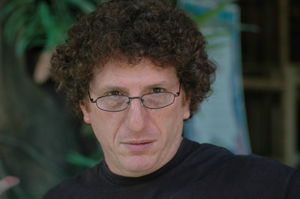Innovative Technology and Informatics Course Prepares Grads for Big Changes in the Profession
 Ron Dolin
Ron Dolin
 Jason Boehmig
Jason Boehmig
This spring Ron Dolin, one of the First 100 at Google and the co-founder of Stanford University’s Program for Legal Technology & Design, teamed up with Jason Boehmig, a 2012 magna cum laude NDLS grad and the president and CEO of the legal technology company Ironclad, Inc., to offer a unique and exciting course on Legal Technology and Informatics.
The course introduces students to the practical and ethical issues relating to the newest legal technologies and their potentially revolutionary effect on the practice of law. Surveying topics ranging from how to pair technology with legal functions, legal technology startups, law practice management software, and the use of technology to increase access to justice, Legal Technology and Informatics also exposes students to prominent leaders in the field through weekly guest speakers that include top management from the Seyfarth Shaw and Orrick law firms, a co-founder of LegalZoom, and professors who are applying legal technology to areas such as access to justice, document automation, and legal prediction.
As Dolin announced in a November 24 tweet linking to his website at Radicalconcepts.com:
Since first creating and teaching this course at Stanford Law School in 2012, I’ve seen the field continue to gain ground across the legal system. In addition to the new material and speakers … we’ll be working partially remotely via the platform being used at Notre Dame — zoom — kind of a Google Hangouts on steroids.”
The class’s guest expert speakers provide concrete and practical illustrations of how the latest technology is being successfully paired with legal functions. For example, advanced search capabilities are enhancing law firm knowledge management, e-discovery, legal research, and research regarding patent prior art, etc. Document automation is being used in transactional work to decrease costs while improving quality: clauses aren’t left off, the correct client information is included, and commodity-oriented work takes less time. Visualization and data analysis is also proving helpful in legal research and can be used for dispute outcome prediction. In all of these instances, increasing quality and decreasing costs leads to better access to justice.
“As a rule,” said Kevin O’Rear, NDLS Assistant Dean for Academic and Student Affairs, “law schools have been slow to address the major changes to legal practice resulting from the ongoing technological revolution. I am delighted that Notre Dame is proving to be a clear exception to that rule.”
According to Associate Dean and Professor Mark McKenna, an expert on intellectual property law who is a driving force behind the Law School’s Program of Study in Intellectual Property and Technology law, “This is a welcome, forward-looking course that is dedicated to readying our grads for the new reality of legal practice in the 21st century, a time in which more law firm and corporate employers are seeking to hire attorneys who are familiar with technology and are able to find creative, non-traditional, cost-effective ways of solving legal problems.”
Both of the course’s instructors have strong tech backgrounds. Co-instructor Ron Dolin received his B.A. in math and physics from U.C. Berkeley before heading to Geneva to work at CERN, the high-energy physics lab. After a few years there, he left for graduate work in computer science, obtaining a Ph.D. from U.C. Santa Barbara with his dissertation on scalable search. After ending up as one of the first 100 at Google, Ron left to get a law degree from U.C. Hastings. Today he is an angel investor focusing on legal technology startups. He has taught legal technology and informatics at Stanford Law School and is a research fellow with the Stanford Center on the Legal Profession. Ron gave the keynote talk about the injection of innovation in big law at the G100 meeting of the CIOs of the 100 largest law firms at the ILTA 2013 conference in Las Vegas, and has recently given talks on legal technology, innovation, and metrics at events in San Francisco, Boston, New York, and Toronto.
NDLS alum Jason Boehmig started his legal career as a corporate attorney in the Startups and Venture Capital group at Silicon Valley firm Fenwick & West LLP, where he worked on early stage venture financings as well as complex corporate transactions for several well-known technology companies. In addition to providing legal counsel, Jason also helped the firm roll out new technology initiatives and managed the deployment of the Series Seed set of open-source financing documents to GitHub. He recently left the firm to become CEO and President at Ironclad, Inc., a legal technology company focused on helping corporations organize and manage their legal documents. Ironclad is backed by IA Ventures in New York City.